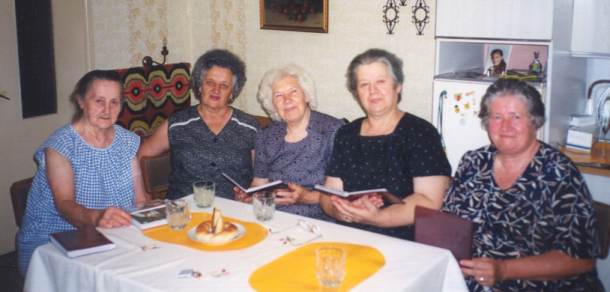
This is my grandmother and her street.

Life is unbelievably relaxing here - if one manages to forget about all the political and economical problems.
My sister Gabi and my father taking a siesta, and
Gabi in grandmother's garden cooling off in the evening.
Even at night the
temperatures were around 28 C.


And this is the street traffic. One of the positive side-effects of the embargo - people can't afford to drive cars any more, and there is no petrol, so the streets are quiet and the air is clean.


Grandmother (86) and her friends on a coffee break. Most of then have just finished making the tomato juice for the winter - for each household it usually involves cooking and mashing about 50 kg of tomatoes by hand.


These ladies are of a tough kind - my grandmother, for example, still insists on chopping by herself all her firewood, heaps of it. And she refuses to let us install running water inher house - she prefers her well.
They are used to working hard: there are large families and large gardens to tend to, and life's small comforts aren'tnearly as awailable as in the west. The pensions comeseveral months late - if they come at all, basic food isn't always available, and one has to grow own vegetables andchicken and to know a freindly cow and be able to make all sorts of household necessities, such as cooking one's own soap, storing enough pickles and meat in the autumn to last for a whole winter, and distilling one's own brandy.

It is an agricultural area, once rich, now unrecognizably impoverished and disassembled by the current situation in Yugoslavia. Here an old abandoned rail house.


A sad picture of departed greatness (well, at least comfort). Even though we laugh and joke alot, it is impossible not to experience poignant sadness at the sight of dilapidated and impoverished lands and people, those that I remember rich, generous and unbelievably hospitable...

Typical street images.


And a typical back yard. This is the grandmother of our neighbour Andrea.
During my childhood there, there was hardly any weekend in any month that we haven't visited my grandparents. I am very grateful for having had the chance to spend so much time with them.



My aunt Evi and her friend Evi, and Bela bacsi. The ladies are retired nursery teachers, and Bela is a blacksmith.
He is making carts and wheels and tractors and just about everything possible from iron. His workshop is on my grandmother's street, and he is always ready for a chat.


And this is Tisza, my favourite river in the world. At its cleanest in the last 30 years or so, because all our factories are at a standstill.


Great swimming. But the best part is not visible from here: Tisza smells lovely, like rain water, especially now that it is so clean again. It is green, and full of fish: we were standing on the top of the boat and watching shoals of fish swim by; they were jumping out of the water like in a fisherman's sweet dream. It is also quite pleasantly warm, around 24 degrees C.
The banks are sandy and straight at parts and thousands of swallows nest in the bank walls. The bottom of the river is muddy, and a special kind of caterpillars, called Tisza Flowers, lives there. They come out in May or September, after 5 years in the mud, turn into white butterflies, live for about 24 hours, fly, mate and die. Then the river is covered with Tisza Flowers and since the fish love eating them there is no fishing for about a week.
But the sight is more than worth it.


Me and Gabi, and her husband Oeystein. Father is playing beach volley with the local youth.


Gabi.

My uncle Laci at work, and my aunt Maria at the boat.


Good life aboard at Tisza. After dinner there is and obligatory watermelon - big, sweet and fresh.


More Tisza: my cousin Ivana and Pista, and my father.


My friends Necko and Vera and their daughter Ivana.


A couple of images from my home town Novi Sad:
they are about 3 years old.
You can tell because the bridge is still there.



|
page 1 of 1
Silvija Seres, August 2000